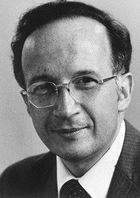
Born: July 18, 1937, Zloczow, Poland (presently: Zolochev, Ukraine)
Early days. Father, Hillel Safran, a civil engineer; mother Klara Rosen, a teacher. In 1943 his father smuggled him and his mother out of the Nazi-German labor camp. They were hiding with the help of a Ukrainian in the attic of a school house. His father was murdered the same year by the Nazis and their helpers. In 1944 after being freed by the Soviets they moved to Przemysl and then to Krakow, Poland, where he went to school. When his mother remarried to Paul Hoffmann his last name was changed to Hoffmann. In 1946 they went through Czechoslovakia to a displaced persons’ camp in Bindermilch in Austria. In 1947 they went to Wasseralfingen camp in Germany and then through Munich in 1949 to NYC, USA. In 1955 he finished there a selective science high school: Stuyvesant High School.
Higher education. In 1955 he started studying in Columbia College as a pre-medical student. In 1958 he began graduate work in Harvard. In 1959 he got a Swedish scholarship from P.O. Lowdin's Quantum Chemistry Group at Uppsala to attend a Summer School.
Marriage. In 1959 he married Eva Boerjesson who he met in Uppsala. The couple has two children: Hillel Jan and Ingrid Helena.
Professorship; research. After spending 9 months as an exchange student in Moscow University, Hoffmann returned to Harvard where, in 1962, he got his PhD. Since 1965 he is at the Cornell University where he is the John A. Newman Professor of Physical Science. He has investigated both organic and inorganic substances, developing computational tools and methods such as the extended Hückel method, which he proposed in 1963. He has made numerous contributions in the field of chemistry, most notably in the area of geometrical structure and reactivity of molecules. Hoffmann and R. B. Woodward (Nobel Prize in Chemistry 1965), developed the Woodward-Hoffmann rules governing the course of certain chemical reactions based on the electronic structures of the reactants. Hoffmann undertook the research leading to his share of the prize when he and Woodward sought an explanation of the unexpected course taken by a reaction that Woodward and his colleagues had hoped to use in the synthesis of the complicated molecule of vitamin B . Hoffmann and Woodward discovered that many reactions involving the formation or breaking of rings of atoms take courses that depend on an identifiable symmetry in the mathematical descriptions of the molecular orbitals that undergo the most change. Their theory, expressed in a set of statements now called the Woodward-Hoffmann rules, accounts for the failure of certain cyclic compounds to form from apparently appropriate starting materials, though others are readily produced; it also clarifies the geometric arrangement of the atoms in the products formed when the rings in cyclic compounds are broken. Recently Hoffmann and his collaborators have been exploring the structure and reactivity of inorganic and organometallic molecules.
Poetry. Popular science. He is also a writer of poetry published in two collections, "The Metamict State" (1987) and "Gaps and Verges" (1990), and of books explaining chemistry to the general public. Also, he wrote a play called "O2 Oxygen" about the discovery of Oxygen, but also about what it means to be a scientist and the importance of process of discovery in science.
He published two scientific-popular books: Chemistry imagined: Reflections on Science (1993) and The Same and Not the Same (1995). In 1993, Hoffmann hosted a 26-segment television documentary on the Public Broadcasting Service entitled The World of Chemistry.
Roald Hoffmann is a prominent member of the Polish Institute of Arts and Sciences of America.
Honors and awards. American Chemical Society has honored him with the Priestley Medal, then in 1981 jointly with R.B. Woodward, the Arthur C. Cope Award in Organic Chemistry, and in 1982 the American Chemical Society Award in Inorganic Chemistry. He received also Pimentel Award in Chemical Education, Award in Pure Chemistry, Monsanto Award, National Medal of Science. In 1981 he was awarded Nobel Prize for Chemistry which he shared with Kenichi Fukui (Japan). In 1995 he got from the Polish Institute of Arts & Sciences of America (PIASA) the Casimir Funk Natural Sciences Award.
Sources:
Autobiography
PIASA
Nobel
Zwolinski
Wikipedia
Return to home page:
Prominent Poles